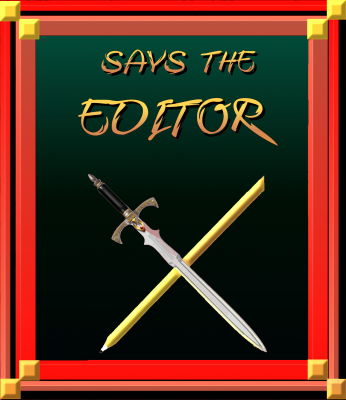August 19, 2021

I’ve been seeing this crop up lately, so let’s talk about how your narrative sequences things: cause and effect, or effect and cause?
Need an example? Here’s one: He turned when he felt…
Now, that seems like it’d work, right? It heightens the drama… He turned! Why did he turn? Well, keep reading and we’ll tell you it’s because he felt (whatever it was that he felt).
But do you see what’s happening here? You have effect and cause, not cause and effect.
Or, in other terms: The character reacts to something before the reader knows what s/he/they are reacting TO. It’s not only a reaction. It can be any motion out there. She walked up the front steps after closing the car door.
As an author working on your first draft, it’s one thing to do this. The first draft, after all, is for figuring out where the story’s going, what’s happening on the page, how the characters are moving (and why)… it’s for learning. This is why I always encourage authors to not be afraid to puke on the page. Get it out, get it down, go back and craft it later.
It’s that later that often becomes a problem. Because it’s one more thing you have to look for, be alert for, know if you have a tendency to do this or not. (Most of us do.)
Go on. Take a look at your work-in-progress. Do you have cause and effect, or do you have effect and cause? And can you think of a time when effect and cause is the better option? I actually can! Don’t rest on your laurels, though. Check your WIP. I bet you’ve got some.
Remember, if you’d like to work with Editor Susan over here, I’m now booked up until November. I’m only taking rush jobs from existing clients; I’m holding up too many careers as it is! And don’t set a bloody presale date until AFTER you’ve gotten your manuscript through the editing stage, just in case your editor is backed up and/or you wind up with unanticipated rewrites.
July 14, 2017
I see this one from time to time, and after thinking about it, I think it’s a misguided desire.
Now, this obviously isn’t something that comes direct to my inbox from a potential client. Nope, those folks (you guys!) are savvier about what they want, and are usually coming to me via a referral, or because they’ve read this here blog and like me and my approach to fiction and to life.
It’s the job wire, the setup where authors send a request to a larger group of editors who belong to the e-mail blast, and the editors have to bid and win over the author. Usually, the poor author is totally overwhelmed with the number of entries and queries they get. So I think they add “Must have experience with a publishing house” as a way to weed out what they think are the hobbiest editors, the people who have sketchy credentials, who will charge large amounts of money and mess up their manuscript. I get that. I respect it.
Unfortunately, they are boxing themselves out of some of the best partnerships they could be making.
Sounds counter-intuitive, I know. After all, an editor who’s been with a publishing house — THEORETICALLY — has extensive editing experience. And they know what it takes to construct a novel for maximum effect.
Except…
I’ve been hearing for over ten years now that editors at publishing houses don’t really do much editing. They don’t have time, torn between meetings and working with their clients. As a result, they want books that are as close to publishable as possible. They aren’t using the expertise being sought by these editor-hunters.
Think about that: Editors don’t have time to edit.
One other thing to consider is that two types of literature have developed: the confined boxes that traditional publishing loves, and the imagination and boundary-pushing fiction coming out of many in the self-publishing world. I work daily on manuscripts that the big houses won’t want because the manuscripts that cross my desk don’t tick the right boxes and don’t follow the current trends. This includes my client, Steve, who just quit his day job to write full-time. (Think about that.)
I get that saying “You must have worked for a publisher” seems like a weed-out technique. I sure didn’t bid on that job, even though the project itself sounded right up my alley, because I’m not going to change this author’s mind. Not in a quick e-mail.
But I also don’t regret not having a background at a publishing house. I love to play with words. I love to work with authors. I love having the freedom of living life on my own terms. I love being able to focus on the manuscript in front of me and delve into what it needs, without making it conform to a checklist so it’ll fit neatly into a marketer’s box. And I’m a better editor for having that freedom.
That author limited himself and excluded me from his future. His loss; it’s my busy season and you guys are starting to line up. Because you guys? You know what’s what. And you don’t want to conform to a checklist and fit into a box… unless it’s a box of autographed books purchased by a huge fan.